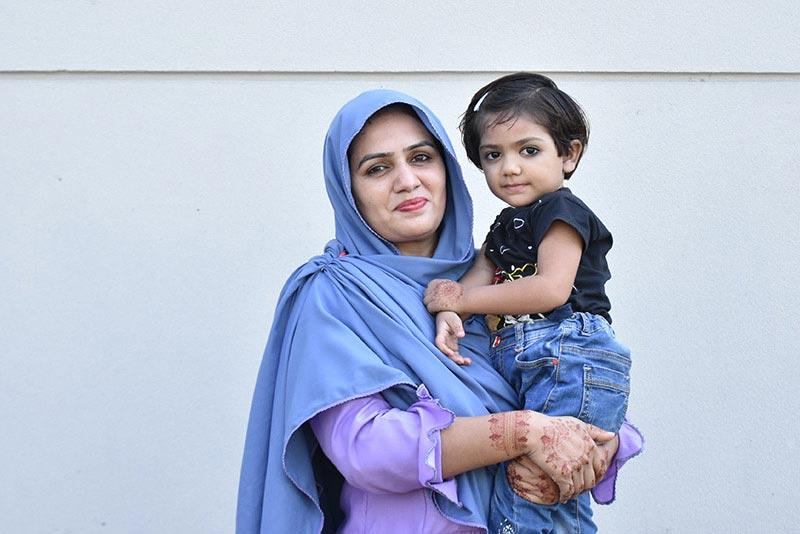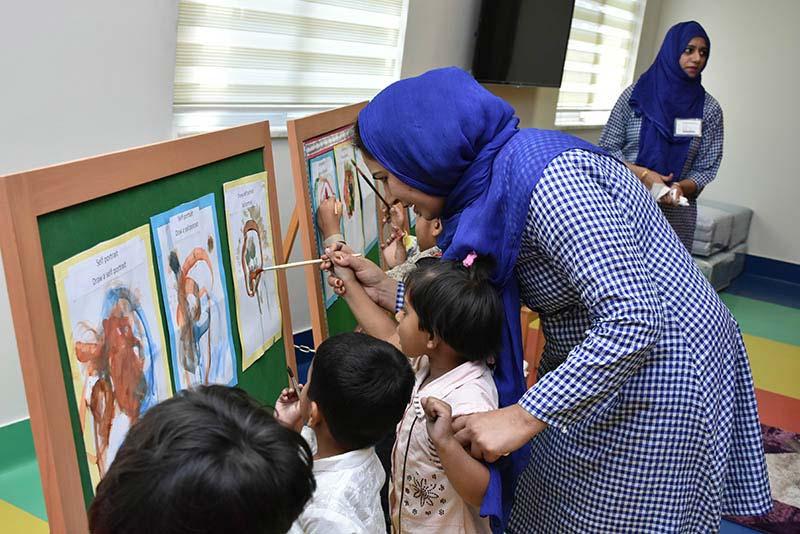By Alec Macfarlane
Not long ago, Samina Kausar and her husband could barely make ends meet. They stitched clothes and did odd jobs in their village in northeastern Pakistan, but it wasn’t enough. So shortly before the birth of their second daughter five years ago, the family moved to the city of Faisalabad, where Samina found work at Interloop, a manufacturer of socks, knitwear, and denim clothing for customers including H&M, Nike, and Uniqlo.
Since then, Samina’s life has changed dramatically—and so have her family’s prospects. Every weekday morning, a company-provided bus picks up her and her daughter and drives them to Interloop’s hub of plants and warehouses just over an hour away. When they arrive, Samina drops off her daughter at one of Interloop’s corporate daycare centers, which also provides its services at no cost. During the day, she frequently drops into the daycare center to visit her daughter, which she says helps refresh her when she’s feeling tired or low.

Samina Kausar and her daughter at Interloop’s Love & Learn Day Care Center. Photo by: Noman Hashmi (2018)
“Having a permanent job and peace of mind is a great blessing,” she said. “But if there was no daycare, I wouldn’t have a job.”
Over the last few decades, a growing number of private sector companies have offered reduced- or no-cost daycare services to their workers. But as businesses grapple with a number of issues around re-opening offices or factories once the pandemic recedes, there’s a new sense of urgency around the question of daycare services for employees’ children. Private sector leaders know their post-COVID-19 decisions will have a major impact on their workforces for years to come.
“The pandemic has had an unprecedented impact on working parents, particularly mothers, in terms of increases in unpaid care work, housework, and the resulting mental health pressures and productivity issues,” said Rudaba Nasir, Global Lead for Employment & Childcare at IFC. “Because of this, companies now understand that if they want to ensure business longevity, the productivity of their employees, and retain the talent they’ve invested in over many years, they need to meet the care needs of their staff. It is central to a resilient and lasting business recovery.”
Disproportionate responsibilities
The burden of childcare on women due to the coronavirus and its economic fallout is having a regressive effect on gender equality. Women’s jobs are 1.8 times more vulnerable to the pandemic than men’s, according to estimates by consultancy McKinsey & Co., and although women make up 39 percent of global employment, they account for 54 percent of overall job losses. One reason for this is that COVID-19 is increasing unpaid care responsibilities, which are shouldered disproportionately by women.
The crisis has led many companies to explore new ways of making their workplaces more family-friendly. Artistic Milliners, a Pakistani denim manufacturer that has been diversifying into renewable energy, recently opened its existing childcare center free of charge to the children of health-care, law enforcement, and other essential workers.
In Italy, bank Intesa Sanpaolo has launched a loan with a low, fixed interest rate and a repayment time of up to 20 years for working mothers, to help them balance their family responsibilities and professional commitments during their children’s early years. The loan may be used freely, to pay for nursery fees or babysitters, for example. In Argentina, IBM Argentina introduced a paid care leave allowance of 20 working days for staff, and has been promoting co-responsibility of home, care, and homeschooling chores. And in Bangladesh, DBL Group, a textiles-to-telecoms conglomerate, formed a COVID-19 committee for worker safety with a focus on pregnant and lactating mothers, and is now offering staff five flexible working hours a day with full salary compensation.
The pandemic has also led some companies to think even longer-term. Monterrey, Mexico-based FEMSA—the world’s biggest franchise bottler of Coca-Cola products by sales volume and the operator of OXXO, the largest chain of small-format stores in Latin America and the second-largest shareholder of Dutch brewer Heineken—is already considered a North Star for its family-friendly policies.
The company opened its first on-site children’s daycare center for staff in 1929. In 2008 it set up the FEMSA Foundation, which aims to make social investments and build resilient, sustainable local communities with young children at their center. The foundation recently co-assembled 12 powerful business groups spanning multiple sectors, including health, manufacturing, and tourism, to create a subcommittee on early childhood development within the Business Coordinating Council, an influential Mexican business lobby.
The committee promotes collective impact to make early childhood a national priority, and is in the process of launching a campaign to encourage companies to put children at the center of their decisions and implement more family-friendly policies. Early discussions have touched on topics including how companies can better incorporate considerations such as staff living conditions and the stage of life they are facing, to developing the infrastructure necessary for breastfeeding mothers, and promoting positive parenting.
“This is the first time in history within a big business council like this that the topic of early childhood development has been embraced,” said Lorena Guillé-Laris, Director of the FEMSA Foundation. “Considering how intra-family violence is increasing in our country and the rights of children have been challenged, it’s becoming mandatory that we all get involved in shaping the future of our country and making sure that our kids get what they need to thrive in the world.”
Evolving government policies
COVID-19 also is forcing countries to rethink their positions on employer-supported childcare and family-friendly policies.
Last month, the government of Fiji announced that it is designing the country's first early childhood care services policy with the help of IFC. Fiji’s economy has been heavily impacted by the pandemic due to the drop-off in tourism, which contributes more than 30 percent of its gross domestic product. The policy is intended to pave the way for quality and safe childcare services for children under the age of five, to ensure the development of basic minimum standards for early childcare services, and to introduce a licensing and inspection system for service providers.
Employers in Fiji are losing an average of 12.7 workdays per employee per year due to parents juggling responsibilities at work and home—and this costs businesses an average of FJ$550,000 ($272,000) annually in lost productivity. Around 43 percent of the country’s workforce have children under the age of five, but only 8 percent use childcare services, with most relying on family members or babysitters.
COVID-19 has changed the way the country views childcare, and this may influence the design of the country’s new policy, said Mereseini Vuniwaqa, Fiji’s Minister for Women, Children and Poverty Alleviation.
“The pandemic has brought different types of challenges for us,” Vuniwaqa said. “School closures, lockdown, loss of employment… all this impacts on childcare in various ways. In developing this policy, we’re now considering the impact of this pandemic on us. Right now, we’re thinking about children up to five years old. But should a childcare policy also make provisions for children that have to stay out of school during a pandemic while their parents work?”
She added: “The challenges the pandemic has brought must be considered to ensure that we become more resilient should another shock such as COVID come upon us.”
Overcoming barriers to work
Expanding access to quality and affordable employer-supported childcare can be particularly impactful in emerging markets and low-income, fragile, and conflict-affected nations, where fiscal space and publicly provided services are often limited and parents must often choose between working or staying at home to care for their children. Lack of access creates a major barrier for women to join the workforce.
The labor force participation rate for women globally was 47 percent in 2019, 27 percentage points lower than for men, according to the International Labour Organization. In Pakistan, where Samina Kausar now receives free childcare from Interloop, women made up just 22 percent of the formal labor force in 2019—the 11th lowest rate in the world. While most provinces in Pakistan have acts requiring employers that meet certain criteria to provide staff with childcare support, only 27 percent of organizations surveyed by IFC provide such solutions, according to a recent report on tackling childcare in Pakistan.
If women and men were to participate equally in Pakistan’s workforce, the country’s GDP could increase by 30 percent, according to a 2018 IFC study.

For companies, the cost of introducing free childcare to employees is often marginal. Photo by: Noman Hashmi (2018)
Employer-supported childcare in the private sector often begins only when mandatory policies are introduced by governments. As of 2019, only 26 developed and emerging economies had introduced a legal requirement for companies to provide or support childcare. While countries such as Singapore and those in Scandinavia are among those leading the way, emerging markets are catching up. Brazil and Jordan have unveiled policies requiring companies to provide childcare options. In 2017, India passed a law requiring companies employing more than 50 people to provide childcare facilities to staff. In contrast, in the United States, only 7 percent of companies offer childcare at or near their worksite, according to the 2016 National Study of Employers.
The costs to companies of introducing free childcare are often marginal. Safaricom, Kenya’s biggest mobile operator, has two on-site crèches (nurseries for babies and young children) in Nairobi. The facilities cost the company $33,300 in 2016, a fraction of a percent of the KES196 billion ($1.8 billion) in sales that the company generated that year.
This is a step forward, said Stop-Winlock’s Nasir, because “Companies around the world are realizing there’s a strong business case for meeting the care needs of their employees. Companies that do so can reduce absenteeism, reduce turnover, increase productivity, and have better relations with their investors and buyers.”
In Faisalabad, Pakistan, Samina Kausar already sees the benefits. Without the employer-provided daycare services at Interloop, she said, “My family and I would have a very difficult life.”
Published in March 2021
